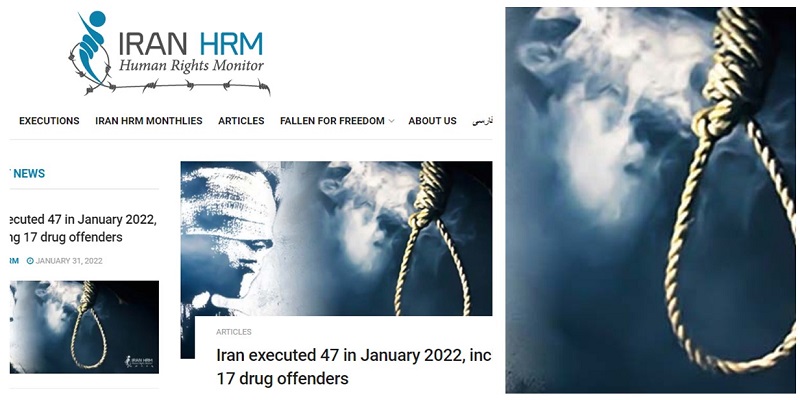
As the first month of 2022 comes to an end, statistics have already come in to account the number of executions that have already taken place in Iranian prisons.
According to Iran Human Rights Monitor, 47 prisoners have been executed by the Iranian regime within the last 31 days, which is a stark increase in comparison to the number of executions that took place in January 2021, which totalled to 31 executions.
Of the 47 latest executions, at least 17 were carried out for drug-related offences and 24 were carried out for murder charges. Of the remaining executions, two men were sentenced to death after being found guilty of charges related to homosexuality, and a further three prisoners were sent to the gallows on the charges of Moharebeh, the Iranian regime’s crime designation for those they believe are ‘waging a war on god’ by opposing the mullahs’ fundamentalist theocracy.
As the regime tends to execute many people in secret and with no official verifiable records, the actual number of executions that have taken place must be considered to be higher than stated, so it is possible that more prisoners have lost their lives in the past month.
Iran HRM said, “The high number of executions highlights the abysmal human rights conditions in Iran which has been worsened since the Ebrahim Raisi took office last year. The clerical regime’s president is known as ‘the butcher of Tehran’ for his direct role in the massacre of 30,000 political prisoners in just a few months in 1988.”
As the Iranian regime continues to face ever growing discontent within Iranian society, they are desperate to preserve their rule in any way that they possibly can, which has led to the intensification of executions, cases of torture, and widespread repression across the country.
It has also come to light that many of the death sentences given to prisoners have been handed down by the Iranian Judiciary have been based on forced confessions from prisoners that have been extracted while they have been subjected to torture from prison officials.
One of the last executions that took place during the first month of 2022 took place on January 17.
Abdolbaset Rigi, a prisoner at Zahedan Prison, was sentenced to death under the charges of “murder” and “collaborating with opposition groups.” The 33-year-old Saravan resident was arrested back in 2018 by Islamic Revolutionary Guard Corps (IRGC) intelligence forces.
During the process of his arrest, interrogation, trial and execution, many ambiguities came to light, with reports that many of his confessions had been made while he was being tortured.
Iran HRM has repeatedly urged the UN Security Council, the UN Secretary-General, the UN Human Rights Council, and the UN High Commissioner for Human Rights, as well as the European Union and its member states, to “strongly condemn the growing number of executions in Iran and to take immediate action to rescue prisoners on death row.”
With the surge in executions in the first month of this year alone, this imperative has become ever more urgent. Human rights advocates and activists from the international community are being called upon to step in and play an active role in controlling the fate of Iran’s death-row prisoners to finally bring an end to the regime’s trend of executions.
Iran HRM has asked the activists to pressure their governments to make all of their economic and political relations with Tehran contingent on a halt to executions, especially the executions and torture of political prisoners, who are routinely horrifically punished for simply fighting for their rights. They have also demanded that foreign governments should also refer the dossier of the clerical regime’s human rights abuses to the UN Security Council.
Iran HRM said, “The UN and its member states should form an international tribunal to hold the leaders of the Iranian regime, especially its supreme leader Ali Khamenei, its president Ebrahim Raisi, its Judiciary Chief Gholam-Hossein Mohseni Ejei, and its parliamentary speaker Mohammad Baqer Ghalibaf, accountable for four decades of crimes against humanity and genocide.”